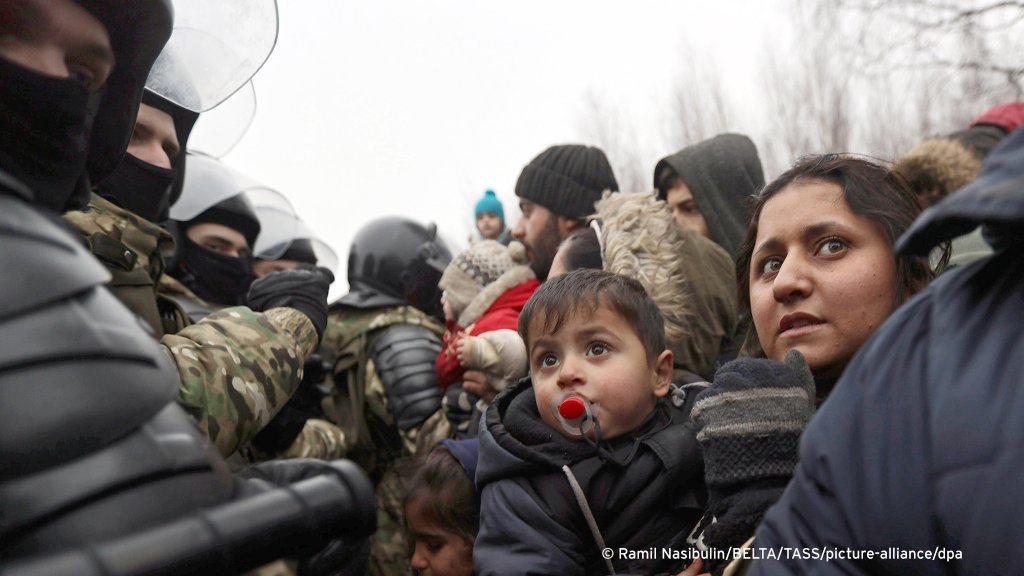New rules approved by the European Parliament will remove some of the barriers to free movement within the passport-free Schengen zone. But opponents fear they will have disastrous consequences for migrants.
The European Parliament voted this Wednesday (April 24) to reform a package of outdated provisions on free movement within the Schengen area.
The aim was to clarify rules and reduce the amount of temporary border controls within the zone, which is meant to allow more than 400 million people unrestricted travel between its 27 member countries.
Why were the changes needed?
The European Commission kicked off the reform of the Schengen Borders Code (SBC) because it felt the bloc had new challenges it had to deal with. The COVID-19 pandemic was one such challenge, which the old rules were not designed for.
Another is so-called "instrumentalization", meaning attempts to blackmail the EU by sending large numbers of migrants to its external borders. Once the new law is adopted, if a country tries to use migrants to put pressure on the bloc, as Belarus did in 2021 or as Finland claims Russia continues to do, the EU country can "temporarily close, or limit the opening hours of, specific border crossing points."
'Controls are the new norm'
When the SBC was drawn up in 2006, European countries also didn't foresee that they would need to control internal borders to stop irregular migration.
In recent years, amid growing concern about the entry of undocumented migrants, they have been largely ignoring the old rules and applying border controls as they see fit.
"Controls are the new norm for many member states," according to the European Parliament’s press service contacted by InfoMigrants.
Also read: Austria and German add border checks, Switzerland may follow
But internal border controls are clearly unpopular with citizens who want to move within the Schengen area without restrictions, so the new code has come up with targeted rules that will allow most people freedom, but will stop undocumented migrants from crossing the border by allowing police checks and "bilateral readmission agreements". This is a procedure whereby a migrant apprehended at the border can be "transferred" (sent back).
How this works in practice is largely left up to the national authorities and it remains a recommendation. Still, the provision has caused alarm among a large number of civil society groups, as well as many in the European Parliament like Greens/European Free Alliance MEP Mounir Satouri, who strongly opposed the reform.
On X, Satouri said: "The ultra-security reform of the Borders Code #Schengen supports fortress EU. Even more attacks on human rights of migrants: surveillance, control, discriminatory restrictions on border crossings."
'Devastating consequences' for migrants
The Platform for Undocumented Migrants (PICUM) has called the vote on Wednesday "shameful", saying the consequences of the new rules would be devastating for migrants.
"This turns the Schengen areas into a tech-contolled space, where racial profiling and internal pushbacks get de facto legitimized," the NGO network wrote on X.
Human rights and civil society groups say that police already single out people based on racial, ethnic or religious characteristics. That's now been given a green light under the new rules.
"Racial profiling is not a novelty and has been further fuelled by the reintroduction of internal border controls," PICUM advocacy officer Silvia Carta told InfoMigrants.
"What changes with the new Schengen rules is that it will be possible to generalize police checks near internal EU borders, even in the absence of internal border checks."
Carta said the police checks are explicitly aimed at reducing irregular migration, by "asking law enforcement to identify people who 'look like' they could be migrants."

No exemption for children
Among those who risk being targeted by authorities and subject to transfer across the border under Article 23a of the new law are families with children.
PICUM and many other groups, including the Danish Refugee Council, the Greek Council for Refugees and Oxfam, say this article allows for internal pushbacks of migrants within the Schengen area which are illegal.
The fact that children are not exempt from these "transfers" worries Carta, in spite of a provision in the final version of the new law inviting countries to "consider the best interests of the child" in accordance with their national laws.
"Children’s best interests should always be protected according to fundamental rights obligations, and experience shows how the rights of children have repeatedly been violated in the context of internal border checks and readmission procedures," Carta said.
The new version of the Schengen Borders Code is expected to be adopted in the next few months.
